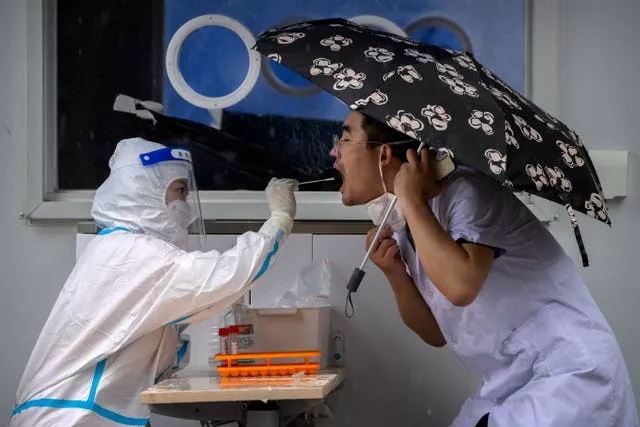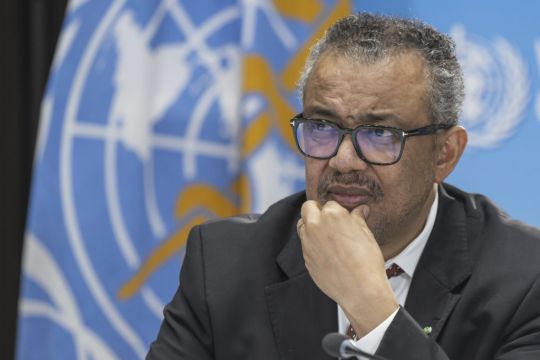The World Health Organisation (WHO) has said Covid-19 no longer qualifies as a global emergency.
The announcement marks a symbolic end to the devastating coronavirus pandemic that triggered once-unthinkable lockdowns, upended economies and killed at least seven million people worldwide.
The WHO said that even though the emergency phase is over, the pandemic has not come to an end, noting recent spikes in cases in south-east Asia and the Middle East.
"It is therefore with great hope that I declare #COVID19 over as a global health emergency.
However, that does not mean COVID-19 is over as a global health threat.
Last week, COVID-19 claimed a life every three minutes – and that’s just the deaths we know about"-@DrTedros pic.twitter.com/n6zad8qSdx— World Health Organization (WHO) (@WHO) May 5, 2023
Advertisement
The UN health agency said that thousands of people are still dying from the virus every week.
WHO director-general Tedros Adhanom Ghebreyesus said: “It’s with great hope that I declare Covid-19 over as a global health emergency.
“That does not mean Covid-19 is over as a global health threat.
LIVE: Media briefing on #COVID19 and global health issues with @DrTedros https://t.co/eNfCX95RaG
— World Health Organization (WHO) (@WHO) May 5, 2023
Advertisement
“Covid has changed our world and it has changed us,” he said, warning that the risk of new variants still remained.
Dr Michael Ryan, the WHO’s emergencies chief, said it was incumbent on heads of states and other leaders to decide on how future health threats should be faced, given the numerous problems that crippled the world’s response to Covid-19.
Countries are negotiating a pandemic treaty that some hope may spell out how future disease threats will be faced — but it is unlikely any such treaty would be legally binding.
When the UN health agency first declared the coronavirus to be an international crisis on January 30th, 2020, it had not yet been named Covid-19 and there were no major outbreaks beyond China.
More than three years later, the virus has caused an estimated 764 million cases globally and about five billion people have received at least one dose of vaccine.
In the US, the public health emergency declaration made regarding Covid-19 is set to expire on May 11th, when wide-ranging measures to support the pandemic response, including vaccine mandates, will end.
Many other countries, including the UK, Germany and France, dropped many of their provisions against the pandemic last year.
When Dr Tedros declared Covid-19 to be an emergency in 2020, he said his greatest fear was the virus’ potential to spread in countries with weak health systems he described as “ill-prepared”.
In fact, some of the countries that suffered the worst Covid-19 death tolls were previously judged to be the best-prepared for a pandemic, including the US and UK. According to WHO data, the number of deaths reported in Africa account for just 3% of the global total.
The WHO made its decision to lower its highest level of alert on Friday, after convening an expert group on Thursday.
The UN agency does not “declare” pandemics, but first used the term to describe the outbreak in March 2020, when the virus had spread to every continent except Antarctica, long after many other scientists had said a pandemic was already under way.
The WHO is the only agency mandated to coordinate the world’s response to acute health threats, but the organisation faltered repeatedly as the coronavirus unfolded.
In January 2020, the WHO publicly applauded China for its supposed speedy and transparent response, even though recordings of private meetings obtained by The Associated Press showed top officials were frustrated at the country’s lack of cooperation.
The WHO also recommended against members of the public wearing masks to protect against Covid-19 for months, a mistake many health officials say cost lives.
"The worst thing any country could do now is to use this news as a reason to let down its guard, to dismantle the systems it has built, or to send the message to its people that #COVID19 is nothing to worry about"-@DrTedros
— World Health Organization (WHO) (@WHO) May 5, 2023
Numerous scientists also slammed WHO’s reluctance to acknowledge that Covid-19 was frequently spread in the air and by people without symptoms, criticising the agency’s lack of strong guidance to prevent such exposure.
Dr Tedros was a vociferous critic of rich countries who hoarded the limited supplies of Covid-19 vaccines, warning that the world was on the brink of a “catastrophic moral failure” by failing to share jabs with poor countries.
He lamented that the catastrophic toll of Covid-19 could have been avoided.
“We have the tools and the technologies to prepare for pandemics better, to detect them earlier, to respond to them faster,” he said.
“A lack of (global) solidarity meant that those tools were not used as effectively as they could have been.
“Lives were lost that should not have been. We must promise ourselves and our children and grandchildren that we will never make those mistakes again.”
Most recently, the WHO has been struggling to investigate the origins of the coronavirus, a challenging scientific endeavour that has also become politically fraught.
After a weeks-long visit to China, the WHO released a report in 2021 concluding that Covid-19 most likely jumped into humans from animals, dismissing the possibility that it originated in a lab as “extremely unlikely”.

But the UN agency backtracked the following year, saying “key pieces of data” were still missing and that it was premature to rule out that Covid-19 might have ties to a lab.
A panel commissioned by the WHO to review its performance criticised China and other countries for not moving quicker to stop the virus, and said the organisation was constrained both by its limited finances and inability to compel countries to act.
Mark Woolhouse, an infectious diseases professor at the University of Edinburgh, described Covid-19 as a “once-in-a-lifetime disaster” and said that broad immunity against the virus meant we were now in a new phase of the outbreak.
Mr Woolhouse noted there had also been significant criticism of the WHO’s pandemic response, in addition to those of its member countries and others.
He said the global community missed numerous chances to stop the coronavirus earlier, in addition to causing “self-inflicted harm” by shutting down much of society.
“Given the ever-present threat of another pandemic, lessons need to be learned,” he said.







